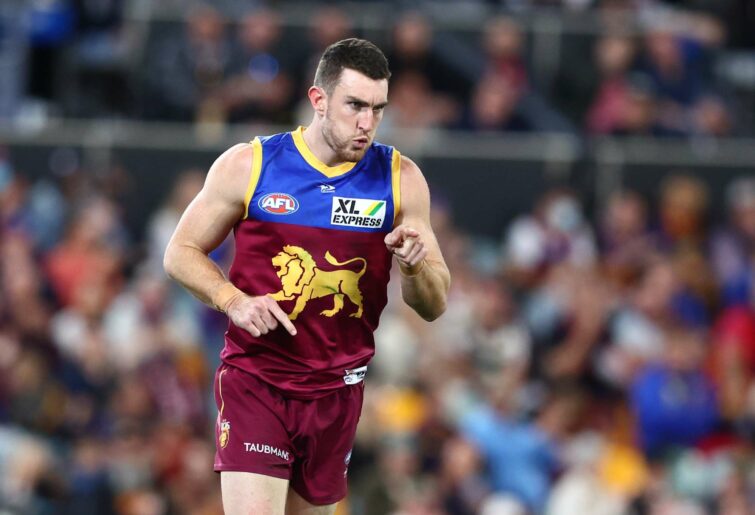
McStay is a solid but unspectacular contributor playing third fiddle behind Eric Hipwood and Joe Daniher. This season McStay’s kicked 22.11, and has gone goal-less in eight of his 19 games. He’s never topped 30 goals in a season in his 158-game, nine-year career.
Is he really the missing piece in the Collingwood puzzle? Collingwood’s surprised everybody by finishing the home-and-away season fourth. Their performances have been built on a solid backbone of experience and an influx of good young talent.
Their recent forward lines have comprised Ash Johnson, Brody Mihocek, Jack Ginnivan, Beau McCreery, Jamie Elliott, Will Hoskin-Elliott, a resting ruckman and a rotation of cameos. Waiting in the VFL is the talented Oliver Henry. Waiting to return from injury is Nathan Kreuger.
Who exactly is McStay meant to displace? He’s not a gun forward who’ll demand a position or usurp a mainstay. He’s not a pressure forward like McCreery, an opportunist like Ginnivan or a runner like Elliott or Hoskin-Elliott.
Although Collingwood’s not overflowing with genuine key forwards, McStay hardly addresses that need either. Possibly Collingwood want to resurrect their Leigh Brown structure, playing a utility forward who can pinch-hit in the ruck, although that would seem counterintuitive to what’s working for them presently.
Perhaps McStay will be thrown down back. With Jordan Roughead retiring this season, Jeremy Howe 33 next year and father-son Will Kelly struggling to command a position, Collingwood’s arsenal of defensive talls is thin. Nathan Murphy has been a revelation, and Trey Ruscoe has shown he can hold down a slot, but both are utilities rather than genuine key positioners.
Is that a role that McStay can fulfil? Certainly he could cameo down there as needed, but is there a position in defence that he can make his own? And do the figures bandied about warrant using him this way?
On the flip side, if the argument is that McStay could play forward, which would allow Kreuger – who played as a defender in the VFL for Geelong – to be thrown back, the question again becomes: who is being displaced to make this happen? Now we’re not replacing just one incumbent but two.
A free-agency recruit should walk into the starting 18, but I just can’t see how Collingwood make McStay fit without sacrificing a regular who has a better return or a young player who’d benefit from the experience and who potentially has dramatically more upside. We’ve seen McStay’s best. We’re yet to see what Oliver Henry’s or Nathan Kreuger’s ceilings are.

(Photo by Chris Hyde/AFL Photos/via Getty Images )
Possibly Collingwood are operating on information they haven’t divulged yet – that Jeremy Howe will retire, that Nathan Kreuger’s injury is worse than we’re aware of, that Oliver Henry wants out – and this is why McStay has been prioritised. That offers context if any of these things are true.
While I’m sure the figures floated in the media are exaggerated, they still threaten a certain irresponsibility.
Collingwood were rightly criticised for the largesse in their salary cap management that led to the 2020 fire sale that saw Adam Treloar, Jaidyn Stephenson, and Tom Phillips jettisoned.
Signing the aging McStay to a long, expensive contract smacks again of what Collingwood did with Chris Mayne in 2017 – and, to a lesser extent, the injury-prone Daniel Wells.
Mayne eventually reinvented himself as an invaluable foot soldier – a defensive winger – for Collingwood, but he was recruited as a forward and played just three games in his first season at the Pies. For the money Collingwood threw at him, you’d be excused for wanting more than a foot soldier. You’d want cavalry.
One counter will be that McStay improves Collingwood’s side. Would he? Would he be better than Ash Johnson, who’s kicked 13.4 in six games? Or Oliver Henry, who’s kicked 21.15 in 15 games? Or Brody Mihocek, who’s kicked 37.23 from 20 games? Or Jack Ginnivan, who’s kicked 36.28 from 20 games?
Or does McStay simply improve Collingwood’s depth? But do you recruit for depth? Do you recruit to sit players in the VFL just in case?
The final argument will be that, as a free agent, McStay is a free hit. But he’s not. Not really. He takes somebody’s spot on the list. He occupies valuable space in the salary cap. What if somebody truly meritorious becomes available next year and Collingwood lack just that bit of salary cap space extra to win them over?
McStay will be 28 next June. There’s no guarantee on his longevity – one might argue that he’s likelier to have a shorter career given the way he plays the game. A three-year contract is speculative. A five-year contract is an outright wager.
Given Collingwood’s best two key-forward prospects in the last five years have been inexpensive lateral selections – Brody Mihocek as a rookie and Ash Johnson as a midseason draftee – one would argue there’s an untapped well of mature-age players who could be plug and play, would be much cheaper to acquire and would also be an investment in a long-term future. At the very least they could play interim roles while Collingwood stockpile the war chest for a genuine star.
Collingwood’s kicked winning scores this year. They’ve held oppositions to defendable scores. Obviously both areas could be improved with genuinely big key positioners. But throughout the season they’ve struggled most in the midfield and with clearances. Surely a big-bodied mid and/or specialist extractor is where the focus should be. Address that and that’ll help the other two areas.
Free agency acquisition (and trading) should improve the list. Securing mid-aged players should immediately improve the side.
There are teams that McStay could walk right into and he’d do that.
He may have fitted Collingwood’s needs when the club were looking at him earlier in the year, but that no longer genuinely seems to be the case.
Do you hold to a course that’s no longer true?

Leave a Reply